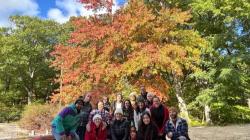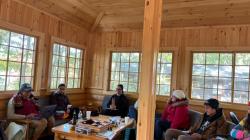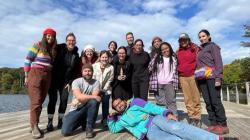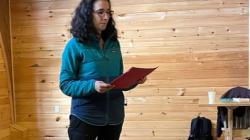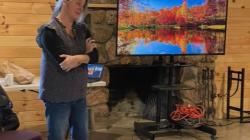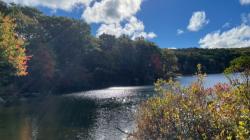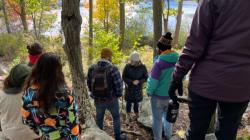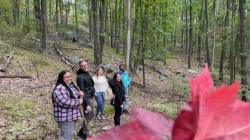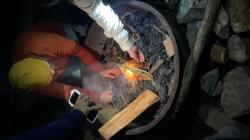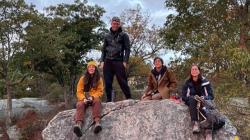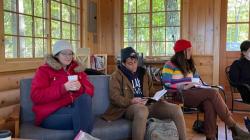About
“Harlem in the Woods” CCNY Writers’ Nature Retreat Debrief—
October 7-10, 2022
Overview
For the second semester, students from the City College of New York participated in a weekend artists residency at the Stephen & Betsy Corman Harriman Outdoor Center. As it was in the first semester, the retreat was designed to both offer our students an escape from the city and deepen their connection to the natural environment while honing their craft as writers. Branded as “Harlem in the Woods,” this retreat has demonstrated nature’s capacity for connection and inspiration. This opportunity was provided at no cost to students, thanks to the generous support of the Appalachian Mountain Club (AMC), the CCNY Outdoors Project and the Office of the President through the College’s “Democratizing the Outdoors” Initiative.
Twelve students participated in this semesters’ four-day retreat, drawn from Professor Emily Raboteau’s Climate Writing course and Michelle Valladares’ poetry writing Prosody course. (Both courses are in the MFA Program in Creative Writing.) We were joined by Professor Ana Carnaval, a biologist whose research primarily focuses on coastal forests. Professor Carnaval delivered a lecture to participants about sugar maples on the first day of the retreat, and led everyone on a nature walk on the second day, where she offered her insights on the senescence of tree leaves in fall, the symbiosis that comprises lichen, the poison glands of a frog that crossed her path, and so much more.
Framing the retreat was the concept of delight, inspired by this years’ Common Read, Ross Gay’s Book of Delights. Participants read Gay’s book, and spent the weekend contemplating and exercising delight, both in their writing and in the various nature hikes, kayaking excursions and moments around the campfire. The mini-capstone of this trip were the “Delight” writings each student produced, a selection of which are included as an appendix to this debrief.
We are pleased to report that a post-retreat survey showed, once again, that students were unanimous in their enthusiasm for the retreat. On a scale of one to ten (one being not likely and ten being very likely to recommend this retreat to other students), all participants responded with a 10 (or occasionally higher). When asked to describe their experience, their responses were overwhelmingly positive.
“Harlem in the Woods was one of the most powerful experiences the school has offered,” one student wrote, “a retreat that offers connection with nature, one another, and ourselves. I left with a full notebook and spirit.” Common among responses was a sense of having connected to a community through CCNY that they had felt deprived of while remote-learning during the pandemic. “I have loved my experience in the MFA program over the past two years,” another student wrote, “but between the isolation of Covid/remote classes and working full-time, it has been difficult to get involved with the MFA community and my fellow students. The retreat was an incredible opportunity to connect with my classmates on a deeper level.” A wider selection of responses has also been included as an appendix to this debrief.
In short, the responses we received from our participants are an affirmation of the value of the Harlem in the Woods retreat, and only strengthen our commitment to continuing and improving this opportunity for more of our students in the future.
-Submitted by Michelle Valladares, Emily Raboteau and Stewart Sinclair
“Harlem in the Woods was one of the most powerful experiences the school has offered––a retreat from city life that offers connection with nature, one another, and ourselves. I left with a full notebook and spirit.”
“When I signed up for the retreat I was nervous. The day we left even more so. I have never considered myself a writer which, I thought, set me apart from everyone else in the group, made me feel like I did not belong there at all. But every aspect of this retreat made me feel like I do belong and even inspired me to think of myself as a writer.”
“My retreat experience was incredible. It was so great to connect with people in the program that I probably wouldn’t have met outside of this retreat. I loved getting to hear other people read their work and to just talk about projects and writing in general. It helped me feel connected to the program in a way I hadn’t before.”
“I enjoyed my time at the retreat. I have to admit I was a bit hesitant to go at first, but I am so glad I did. It was a weekend I will never forget.”
“I enjoyed my time at the retreat more than I can properly put into words (which is saying something, all things writerly and not considered). I went into it feeling alone at City College, more than a little adrift, and now I feel like a part of a community of like-minded, similarly striving writers, and friends. And the lake and the mountains and the forest are, of course, beautiful. And the cabins are clean. And the food is delicious. And the coffee is, for us, free. But it’s the people I’ll remember, the moments we shared.”
“If you have the opportunity to attend, you should take it! Come to the retreat with an open mind and you will be transformed.”
“This was an utter joy! I was able to shed the city, breathe in my roots and connect back with myself. I was also able to connect with so many other incredible human beings! My peers and professors who came offered tender insights, joy, depth and inspiration in every conversation. I filled up the artist well/the writer’s well with so much color and cool air and ideas. And I wrote. I wrote from a place of grounding and centeredness. I wrote from my own filled well.”
“It was wonderful! I felt refreshed and rejuvenated to be in nature. I enjoyed the opportunities to do activities like kayaking, nature walking, and hiking. I thought the lodgings were very clean and comfortable (except for the cold, but that was okay!) The grounds are beautiful and engaging. I loved the little library. The food was excellent and all the food options were impressive. I think the retreat was the perfect amount of time. I appreciated the balance between planned activities and free time. I enjoyed time specifically meant for writing and the times for sharing and feedback. And obviously my favorite part was forging and strengthening relationships with other writers.”
“I am so glad and grateful I was able to participate in the retreat. I have loved my experience in the MFA program over the past two years, but between the isolation of Covid/remote classes and working full-time, it has been difficult to get involved with the MFA community and my fellow students. The retreat was an incredible opportunity to connect with my classmates on a deeper level. It was also a beautiful and reflective setting that was literally a breath of fresh air from daily life in the city. I was able to clear my mind, focus on writing, and enjoy awesome outdoor activities (hiking, kayaking, campfire, etc) surrounded by an amazing group of people. I left the retreat feeling re-energized on so many levels."
Delights Writings
The following is a sampling of several “Delights” pieces that students wrote on this retreat
Delight 1: “Waltz”
Earlier, my hands go confused. Gripping the paddle on its black, slightly sticky part they suddenly forgot how to propel me forward. And who can fault them? They’ve been as cold as they haven’t been in a while, my thumb supporting a pen for a confusingly large part of the day instead of performing its usual down-up, down-up scrolling motion. My hands tried a couple of movements, awkwardly wiggling the paddle back and forth, left and right like one of those dancers with a stick and top hat. And because I’m awkward, I turned around to the dock to make sure nobody took note of the dance session I was putting on. Luckily, only the oaks chuckled at my sight. Rediscovering the marvel that is using a paddle I thought about how delightful the cycle of defamiliarization and rediscovery can be—like pronouncing a word over and over again: delight, delight, delight, delight, delight, delight, delight, delight, delight, delight, delight, … What has meaning becomes peculiar, even funny, or a meme, or loses its meaning entirely before you rediscover it: delight! It can be like a waltz — or a box step, as it’s called here — two steps back and one step closer. Two steps away from the city and one step closer to a group of wonderful strangers. Eventually, my hands and the paddle waltzed back to this pen and paper, the waves giving a soft beat, the wind playing Shostakovich on the oaks.
Delight 2: “Saying Yes”
As excited as I was to go on the retreat when I first heard about it, as the day drew near, I became very anxious. I am very introverted and the thought of socializing with people I barely knew scared me. I can be socially awkward at times and I knew I wouldn’t be able to hide behind my phone. I thought about faking an illness or just admitting defeat, but then I sucked it up and packed my suitcase. Once I was there and started to talk to people my fears began to ease. Especially, when Terri so kindly let me ride in the canoe with him and we had a nice chat around the pond. That’s when I knew, this weekend wouldn’t be so bad.
I went on a hike and I didn't fall, I went on a canoe twice and I didn’t die, heard some very interesting limericks, was awakened by some very strange cult music, I used the bathroom alone twice in the middle of the woods, I made s'mores around a campfire, and most importantly I met some amazing people. My experience was a success and I'm so glad I said yes. My delight of all delights was being around all of you
Delight 3: “The North Wind”
The North Wind breathes through a crown of trees and against the lake’s face. Reflecting on it, the swatch of greens and brushes of red mingle to a twilight gray. Then, the air goes still again. The trees take back their shapes on the liquid, living paint on living canvas. I take my pen, but cannot find the language to breathe the same life into it again.
The first few hours of our writers retreat to Harriman State Park present a curious convergence of connection and disconnection. The cacophony of city sounds rolls back to a trillion rustling leaves, and greater yet, the rustling of memories and reflections on the natural world I haven’t had in some time.
It all sounds so romantic, does it not? Yet the terms to describe these moments, at least in the absence of some digital reference point — a dictionary.com or Wikipedia perhaps — feel far, far away and this speechlessness carries its own mark of quiet agony.
Without the Wi-Fi, words appear in my mind as veiled shapes. Just as you might find a piece of furniture covered with a dusty linen in some forgotten room or attic or, more aptly, cabin. I try to pull it back and reveal what’s underneath. More times than not, the coverings catch a snag. A half reveal. An unrealized insight. A sentence rendered incomplete; figuratively and literally, and with it the worry my mind has gone a bit lame. The single bar flashing on my cell phone, just as much a measure of my service — cellular, or otherwise — as it is a measure of my vocabulary to describe the natural world as I’m seeing it.
My new friend, Ali, sits next to me. A fellow writer on this trip, he is a sort of philosophical guide to many of us though he may not know it; his insights gifted to us in the form of tough questions. I might be languishing, for an hour or so, over the language to describe the autumnal flush of a nearby tree, when suddenly, somewhere from the periphery where I hadn’t even the mindfulness to see him, he turns to me with a question that weighs with meaning-of-life enormity.
“What is language, after all?” He asks. It stuns me. Quietly crushing the significance of my writing exercise and drawing me into a philosophical crisis. I like to raise questions about the nature of word choices, and Ali seems to raise the more profound questions about the nature of existence. What language is, my own abilities to shape it as a medium, and its potential to shape the hearts and minds of others — have all been questions swirling like leaves in my head this day. Questions I simply wish to rake from my mind.
“Language” he continues, “is how we see the world. By expanding our language we are expanding our consciousness.”
I stare at him, delighted by the revelation. “We’re so alike,” he continues. And I laugh, because in the exact moment that I’m thinking about how different we are he makes me stop and take stock of just how similar we are, too. Asking questions, writing to find the answers, and both of us here hoping to shape our voices and paths.
Eventually, I’ll get that second or third bar back on my cell service. Access to words like trunk and bole, limb and twig. The fine details of branch, stem, leaf, and sinus, or (in case you wish to be reminded) lobe, pistol, stamen, stalk, filament, and bud. Not to mention, all those wonderful colors on the spectrum from apricot to zaffre blue. But access, and connection, in themselves are very different from one another. Just as it is with our relationship to memory, to each other, and to nature. And it has me wondering — worrying really — what it means to lose our immediate connections to the very words we once had to describe the natural world.
“Shakespeare created over 200 of his own words,” Ali tells me the very next day on our morning hike. He has no idea what comfort this brings me and I quickly inventory the flora and fauna for ways to leave my mark on the English language. I deem an unusual rock formation that looks thrown across the water, a “stone shuckle” and a rotten patch of moss a “sad greener.”
Ali pauses to tell me he just had the sudden urge to crouch down and smoothe the dirt all over his face. For me, it conjures the worry of bacteriums unknown and a future face full of clogged pores. For him, it is an opportunity for grounding and a more intimate relationship with the earth. We reach a place where the oak forest opens up to the bank of sand where canoes, life jackets, and oars are stored, and I find him at the lake’s shallows – a jacketed hunch of teal and purple, baptizing his face in the frigid waters with the unique brand of stoic expression I might, until now, only have reserved for a Buddhist monk.
I hear a chime. My phone draws a thread of service, pulling with it a string of e-mail notifications and messages from mom, boyfriend, work, and offers of this weekend’s autumn sales. I reserve the bandwidth to download an offline version of the Merriam Webster Dictionary, because The Oxford English Dictionary, which I would have preferred, simply doesn’t load. And it is then that all feels settled and unsettled in the natural world.
Delight 4: “Whitman/Ross Gay”
The light is magic in the morning as it spreads its arms and stretches knocking into the fog overlaid on the lake’s freezing water
that light yawns and sighs out a golden exhale that tips the tops of the trees and their leaves senescing with their vibrant deaths of red, yellow and orange the green chlorophyll leaving like a lover in autumn after a passionate summer
the light atop the lake’s glass surface with its wavy hallelujah it skips, shimmers, shimmies moving across like a finger brushed tender over a brow
oh, to be the lake’s brow brushed with that tender fingertip oh, to be the hand that grazes that brow to be that kind of tender touch
oh, to be the light spiraling onto the forest floor fragmented by trees bed of decomposing leaves, mushroom stools the thick skin of the taupe frog as he hides against the fallen oak tree that dying trunk now its own habitat for bugs, beetles, orange newts so bright after a rainfall
I stand head upturned as if to be kissed I stand open throated head tipped all the way back to see the canopy of green leaves still plump with their chlorophyll intermingled with the chartreuse, amber and scarlet crowns of the sugar maple and oak
I stand head tipped thus eyes closing as if in prayer which I never pray anymore- to gods but I’m in prayer all the same the prayer of paying attention the prayer of being in a state of attention an embodied prayer
a praying with the whole body as it stands on the moss plush and springy pushing back against my feet merrily and I feel beneath the moss the decaying leaves of last year’s senescence and the year before that and the year before
a praying with the whole body as the wind moves in waves across my nose and cheeks adding pink there an actual kiss of sun and wind chap
a praying of the whole body to be still in the midst of the great humming and buzzing world around me and within
Last Updated: 05/23/2023 15:07
